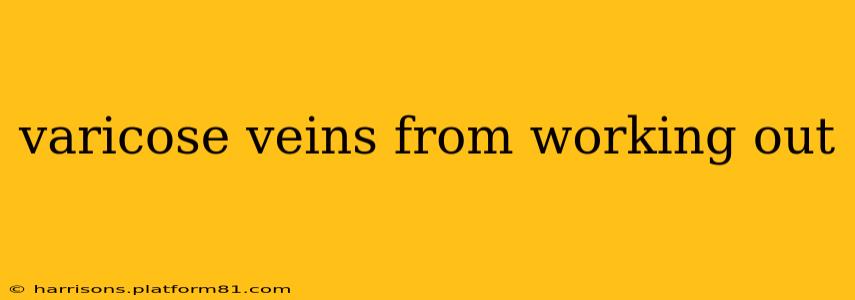Varicose veins, those unsightly, bulging veins often appearing on the legs, are a common concern. While many associate them with age and genetics, a question often arises: can working out actually cause varicose veins? The short answer is complex: intense or prolonged exercise might exacerbate existing conditions or predispose someone to developing them, but it's not the primary culprit. Let's delve deeper into this topic and separate fact from fiction.
Can Working Out Cause Varicose Veins?
While working out itself doesn't directly cause varicose veins, certain types of exercise, particularly those involving prolonged standing or high-impact movements, can put extra stress on the leg veins. This increased pressure can worsen existing varicose veins or contribute to their development in individuals already at risk. It's crucial to understand that genetics, age, hormonal factors, pregnancy, obesity, and prolonged periods of standing or sitting are far more significant contributing factors.
What Kinds of Exercise Might Worsen Varicose Veins?
High-impact activities like running, jumping, and weightlifting, when performed intensely and without proper support, can increase pressure in the leg veins. Similarly, prolonged standing, such as during long periods of work on your feet, significantly contributes to venous pressure. While these activities themselves aren't solely responsible, they can act as aggravating factors for those predisposed to varicose veins.
What Exercises Are Better for People with Varicose Veins?
The good news is that regular exercise is crucial for overall health, even with varicose veins. However, choosing the right types of exercise is essential. Low-impact activities like swimming, cycling, and brisk walking are generally recommended. These exercises improve circulation without putting excessive strain on the leg veins. Remember to maintain proper posture and consider wearing compression stockings during and after exercise, especially for longer sessions.
How Can I Reduce My Risk of Developing Varicose Veins?
Several lifestyle modifications can significantly reduce the risk of developing varicose veins or worsening existing ones:
- Maintain a healthy weight: Obesity puts extra stress on the veins.
- Elevate your legs: Elevating your legs regularly helps improve blood flow and reduce pressure.
- Wear compression stockings: These stockings provide support and improve circulation.
- Avoid prolonged standing or sitting: Take regular breaks to move around and stretch your legs.
- Quit smoking: Smoking damages blood vessels and increases the risk of varicose veins.
Are There Specific Exercises I Should Avoid If I Have Varicose Veins?
You don't necessarily need to avoid all forms of exercise. The key is moderation and choosing low-impact activities. Avoid prolonged intense high-impact activities and listen to your body. If you experience significant pain or discomfort during or after exercise, stop and consult your doctor.
Can Working Out Make Existing Varicose Veins Worse?
Yes, intense or prolonged exercise can exacerbate existing varicose veins. The increased pressure on leg veins during strenuous activity can worsen symptoms like pain, swelling, and aching. Always prioritize your comfort and adjust your workout accordingly.
What Should I Do If I Think My Exercise is Worsening My Varicose Veins?
If you suspect your exercise routine is contributing to worsening varicose veins, consult with your doctor or a vascular specialist. They can assess your condition and recommend appropriate treatment options and adjustments to your exercise plan. Remember, proper diagnosis and personalized advice are crucial for managing varicose veins effectively.
Conclusion: Exercise and Varicose Veins
While exercise is undeniably beneficial for overall health, its impact on varicose veins is nuanced. While it doesn't directly cause them, certain types of intense or prolonged exercise can exacerbate existing conditions or increase the risk in susceptible individuals. Prioritizing low-impact activities, maintaining a healthy weight, and listening to your body are crucial for preventing or managing varicose veins while reaping the benefits of regular physical activity. Always consult with a healthcare professional for personalized advice and treatment.
